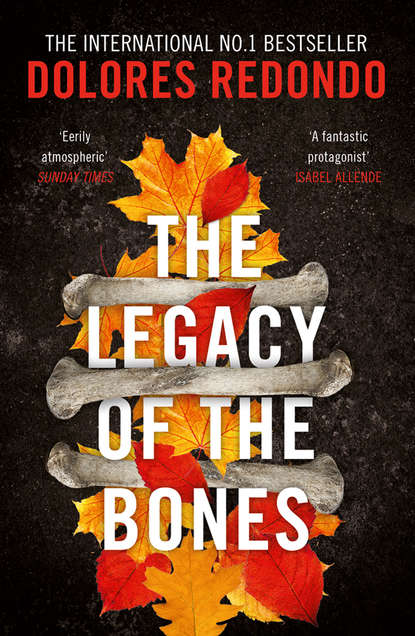По всем вопросам обращайтесь на: info@litportal.ru
(©) 2003-2024.
✖
The Legacy of the Bones
Автор
Год написания книги
2019
Настройки чтения
Размер шрифта
Высота строк
Поля
‘Good morning, Mr Quiralte. My name’s Detective Inspector Fer—’
‘Wait a minute,’ interrupted Quiralte. He raised his cuffed hands, accompanying the gesture with a flick of his hair worthy of a diva in a celebrity magazine. ‘Don’t I get to be interrogated by the star cop?’
‘Who do you mean?’
‘You know, that inspector woman from the FBI?’
‘How do you know about that?’ asked Fernández, taken aback. Amaia clicked her tongue in annoyance. Quiralte smirked.
‘Because I’m smarter than you.’
Fernández looked nervous. He had little experience interrogating murderers, and the suspect had already succeeded in unsettling him.
‘Don’t let him get the upper hand,’ muttered Amaia.
As if he could hear her, Fernández took control of the interview.
‘Why do you want her to interrogate you?’
‘Because they tell me she’s hot, and I’d rather be questioned by a pretty woman inspector than by you any day,’ he said, settling back in his chair.
‘Well, you’ll have to make do with me. The inspector you are referring to is on leave.’
Sneering, Quiralte turned towards the two-way mirror as if he could see through it.
‘Well, that’s a shame, I’ll just have to wait until she gets back.’
‘You don’t intend to give a statement?’
‘Of course I do.’ He was clearly enjoying himself. ‘Don’t pull that face, if the star cop isn’t here, take me before the judge and I’ll tell him I killed that stupid cow.’
And that was precisely what he did. He confessed straight away, only to remind the magistrate impudently that without a body there was no crime, and that for the moment he had no intention of telling them where it was. One of the youngest magistrates on the circuit, Judge Markina’s chiselled looks and stonewashed jeans occasionally fooled some felons into giving too much away, as had been the case with Quiralte. He gave the man one of those dazzling smiles that wrought havoc among the female clerks, before ordering his detention.
‘So, no body, eh, Mr Quiralte? Well, then we’ll just have to wait until it appears. I’m afraid you’ve been watching too many American movies. The fact of admitting that you know where the body is while refusing to divulge this information is reason enough to detain you indefinitely. Moreover you’ve confessed to a murder. A spell in jail might refresh your memory. I’ll talk to you again when you have something to tell me. Until then …’
Amaia had walked home, trying to thrust the details of the case from her mind, as an exercise in self-control but also to get herself in the mood for celebrating her final day at work with James. The baby was due in two weeks’ time, and although she felt perfectly capable of working right up until the last moment, James had persuaded her to take some annual leave because his parents were due to arrive the following day. After dinner, she had fallen into bed, exhausted, and gone to sleep without realising it. All she remembered was that one minute she was talking to James and then, nothing.
She heard the woman first, before she saw her. She was shivering with cold; the sound of her teeth chattering bone against bone was so loud it caused Amaia to open her eyes. Lucía Aguirre was wearing the same red-and-white knitted sweater as in the photograph in her hallway, a gold crucifix round her neck, short fair hair, no doubt dyed to mask the grey. Nothing else about her appearance resembled the cheerful, self-possessed woman who was smiling at the camera. Lucía Aguirre wasn’t weeping, wailing or sobbing, yet there was a deep, distressing pain in her blue eyes that gave her face an air of profound bewilderment, as if she understood nothing, as if she couldn’t accept what was happening to her. She stood quietly, disoriented, rocked by a relentless wind that seemed to blow from every direction and made her sway rhythmically, adding to her air of helplessness. Her left arm was clasped about her waist, in a self-protective gesture that afforded her little comfort, and every now and then her eyes would cast about like searching probes, until they met Amaia’s gaze. She opened her mouth, surprised, like a little girl on her birthday, before starting to speak. Amaia watched the woman’s lips, blue with cold, but no sound emerged. She sat up in bed, concentrating as hard as she could, trying to understand what the woman was saying, but she was far away and the deafening wind carried off the muted sounds emerging from her lips, intoning over and over words that Amaia couldn’t hear. She woke up in a daze, infected by the woman’s anguish, and her own increasing sense of despair. This dream, this phantom-like apparition, had shattered her state of grace, the freedom from fear she had enjoyed since conceiving her daughter, a time of peace when all the nightmares, the gauekos, the ghosts had been exiled to another world.
Some years earlier, in New Orleans, sitting one evening with a cold beer in a bar on St Louis Street, a jovial agent from the FBI had asked her:
‘So, tell me, Inspector Salazar, do murder victims appear at the foot of your bed during the night?’
Amaia’s eyes had gaped in astonishment.
‘Don’t try to fool me, Salazar; I can tell a police officer who sees ghosts from one who doesn’t.’
Amaia stared at him in silence, trying to decide whether he was joking or not, but the agent went on talking, an inscrutable smile playing on his lips.
‘I know, because they’ve been doing the same to me for years.’
Amaia smiled, but Special Agent Aloisius Dupree looked her straight in the eye and she knew he was serious.
‘You mean …’
‘I mean, Inspector, waking up in the middle of the night and seeing the victim of the crime you are investigating standing beside your bed.’ Dupree’s smile had vanished.
She gazed at him uneasily.
‘Don’t let me down, Salazar. Are you going to tell me you don’t see ghosts? I’d be disappointed.’
She was alarmed, but not enough to run the risk of looking like a fool.
‘Agent Dupree, ghosts don’t exist,’ she said, raising her glass in a silent toast.
‘Of course they don’t, Inspector, but if I’m not mistaken – and I’m not – more than once you’ve awoken in the middle of the night having sensed the presence of one of those lost victims at the foot of your bed. Am I mistaken?’
Amaia took a sip of beer, determined not to tell him anything, but inviting him to go on.
‘You shouldn’t feel ashamed, Inspector … Would you prefer me to say that you “dream” about your victims?’
Amaia sighed. ‘I’m afraid that sounds just as disturbing, dubious and deranged.’
‘Aye, there’s the rub, Inspector: labelling it as deranged.’
‘Explain that to the FBI shrink or his equivalent in the Navarre police,’ she retorted.
‘Oh, come on, Salazar! Neither of us would be foolish enough to expose ourselves to the scrutiny of a shrink when we both know this is something he or she would be incapable of understanding. Most people would think that a cop who has nightmares about a case is at the very least stressed out or, at worst, if you push me, emotionally over-involved.’
He paused, draining the dregs of his glass then raised his arm to order another two beers. Amaia was about to protest, but the stifling New Orleans heat, the soft tones of a piano whose keys someone was stroking at the far end of the room, and an old timepiece stopped at ten o’clock which took pride of place above the bar, made her change her mind. Dupree waited until the barman had set down two fresh glasses in front of them.
‘The first few times it scares the pants off you, to the point where you think you’re starting to go crazy. But that’s not true, Salazar. On the contrary, a good homicide detective doesn’t possess a simple mind, or simple thought processes. We spend hours trying to figure out how a murderer’s mind works, how he thinks, what he wants, how he feels. Next, we go to the morgue, where we view his work, hoping the body will tell us why, because once we know the killer’s motive, we have a chance of catching him. But in the majority of cases the body isn’t enough, because a dead body is just a broken shell. For too long perhaps, criminal investigations have been more focused on understanding the mind of the criminal than that of the victim. For years, murder victims have been seen as little more than the end products of a sinister process, but at last victimology is coming into its own, showing that the choice of victim is never random, even when it’s made to appear so, that too can provide clues. In dreaming about victims, we are accessing images projected by our subconscious, but that doesn’t make them any less significant. It’s simply another form of thought-processing. For a while those apparitions of victims by my bed tormented me. I used to wake up drenched in sweat, terrified and anxious. I’d feel that way for hours, while I tried to figure out to what extent I was losing my mind. I was a rookie agent back then, partnered with a veteran. Once, during a long, tedious stakeout, I woke up suddenly in the middle of one of those nightmares. “You look like you’ve seen a ghost,” my partner said. I froze. “Maybe I did,” I replied. “So, you see ghosts too?” he said. “Well, next time you should pay more attention to what they say instead of hollering and trying to resist.” That was good advice. Over the years, I’ve learned that when I dream about a victim, part of my brain is projecting information which is already there, but which I haven’t been able to see.’
Amaia nodded slowly. ‘So, are they ghosts or projections inside the investigator’s mind?’
‘Projections, of course. Although …’
‘Although what?’
Agent Dupree didn’t reply. He raised his glass and drank.
She roused James, trying not to alarm him. He sat up in bed with a start, rubbing his eyes.
‘Is it time to go to the hospital?’
Amaia bobbed her head, her face pallid as she gave a weak smile.
James pulled on the pair of jeans and jumper that he had laid out in readiness on the end of the bed.











